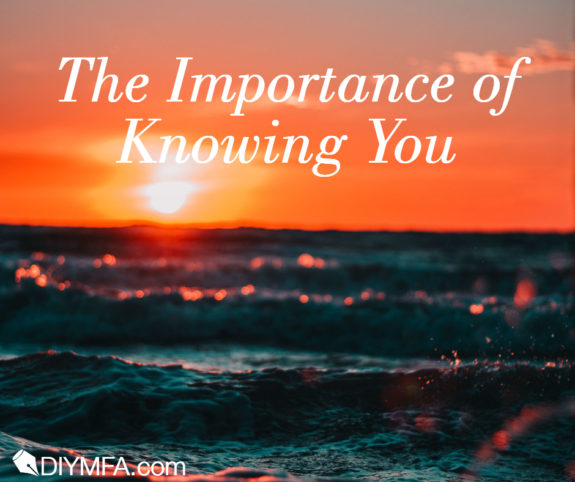When I first moved to Washington, D.C. at the end of the summer in 2012, I was at the end of my first and only college relationship—I just didn’t know it yet. A month-long “break” turned into a break up and I was broken. Though a significant part of that brokenness came from someone I loved rejecting me, the even more significant part was the manifestation of my sadness and grief into depression. So, after a loving but firm push from my closest friends, I entered therapy for the first time. The experience was transformative because I got to really, truly know myself. And that was so important not only for my mental and physical health, but also my creativity and—by extension—my writing.
Every failure, every good circumstance turned sour, every unmet expectation or unfulfilled dream is another opportunity to get to know ourselves better. Our thoughts and actions, how we react to others and even how we treat ourselves is integral to our creativity and our writing.
In the nearly four years that followed after that first session, I dedicated time every week both with and without my therapist to parse through who I was and who I was becoming. During that time I felt my imagination open up in ways I never knew possible because of how well I was learning to understand me and my motivations, which in turn helped me better understand others and theirs. As a result of that learning and knowing, I was inspired to:
Write Fuller Characters
When I’m nervous or anxious about something, I tend to hold my breath. My therapist had to keep reminding me to breathe whenever I spoke about something that made me uncomfortable or vulnerable. I also speak very quickly when I fear judgement from others, so sometimes I run through things as fast as possible to get them over with.
These quirks continued to pop up as time went on and eventually, I began to observe similar behaviors in my friends and family, and how they interacted with each other and themselves. Some of my characters now hold a few of these traits, which gives them a depth they’d always been missing. The main character of my novel, for example, holds her breath when she’s anxious and runs when she’s emotionally overwhelmed.
Creative exercise: Pay attention to how you interact with others and yourself. Make note of your body position, if there are phrases you repeat again and again. And be sure to pay attention to others’ interactions, as well. These small signatures in language and body can help inspire how you write characters in stories, and how they respond to others and the circumstances they’re in. Engaging in this learning will help deepen your characters on the page because they’ll hold a shared human experience with your readers.
Tell More Detailed Stories
As a storyteller, having a captive audience of one for a full hour every week was everything to me. I got to tell my therapist the stories I wanted to tell, in my own way, from my own perspective. The issue, however, was that I usually gave my therapist the “big picture.” I spun a good yarn, but the finer more substantive details were things I’d leave out. Though a lot of that had to do with my lack of self-confidence, it was also an issue of keeping those details all to myself because I either assumed they were obvious or I thought they weren’t worth noting. But once I started adding in those details, my stories on the page and to my therapist drew richer pictures and held more meaning.
Creative exercise: Try picking up on the tiniest of details wherever you go, from the location to the people to the general mood. Each note can help inspire unique details for your stories that give audiences one-of-a-kind insight into how both you and your characters think, and what is most important. Additionally, these small observations can be fodder for building upon older worlds in your stories and creating new ones.
Learn the Ultimate Why
One of my most stark memories during those nearly four years in therapy was a moment in time where I was easily irritated by my best friend. Any and everything she did, I found something to complain about or feel agitated by, even when her behaviors weren’t directed at me. It wasn’t until a few weeks after it started happening that, on my own, I was able to parse through why.
She was confident, beautiful and beloved, all things I couldn’t see or refused to believe were true about myself. So, anything she did was irksome. But once I discovered why I was responding that way, it helped me understand my feelings weren’t about her. They were about me. That period’s now long behind us, but because of it I gained an invaluable creative tool for my stories.
Creative exercise: Try thinking about your own ultimate whys. Why do you really talk to a certain person? Why do you eat foods you don’t like? Why do you feel hurt more than you think you should? Everytime you answer a question, challenge yourself to go a little bit deeper. Write one more sentence, like someone is asking you to tell them more, then write another one. Keep going until there’s nothing left to say. Then try the same thing with your characters’ thoughts and actions. Doing this can help inspire not only their ultimate whys, but also your story’s, and deepen a reader’s connection to your work.
Though I didn’t know it at the time, that first break up was perhaps one of the best things that could’ve happened to me. It was the catalyst to beginning the process of self-examination and pulling apart 20-something years worth of brokenness while more fully understanding what it means to be human.
Knowing and learning about yourself is one of the best and most important things you can do for the sake of your own health and the health of those around you, but also for the health of your imagination and creativity. Because when you know yourself, you’re more open to being inspired by the relatable and empathetic characters in your own life, and can create stories on the page that truly resonate.

Jenn Walton is a writer, editor and storyteller based in Washington, D.C., whose fiction works are housed mainly in the speculative genre. She is currently working on her first novel project that explores, through the lens of a failing utopia, what happens when society gives in to its fear of the other. She previously wrote for a communications firm where she drafted and edited sponsored and organic content for top-tier academic institutions, Fortune 500 companies and leading philanthropic organizations that has run in The Washington Post, USA Today and the Atlantic. For more from Jenn, please visit her at her website or on Twitter.







